Vanessa Heaslip and Jane Fry are re-commencing the across faculty Phenomenology Interest Group (originally created by Les Todres and Kate Galvin). This group’s aim is to explore and share the philosophy of phenomenology and its research methodology. The first session will be launching a series of films of Les Todres in conversation with Vanessa and Jane. Film clips will be shown concerning elements of philosophy and research to stimulate debate and discussion. Please contact Dr. Vanessa Heaslip (vheaslip@bournemouth.ac.uk) or Dr. Jane Fry (jfry@bournemouth.ac.uk) for expressions of interest.
Category / Uncategorized
Performance of Gemmeleg at NIME 2017, Copenhagen

Rehearsal in the Black Diamond
Gemmeleg is a composition by Laura Reid cellist/composer for the performance system The Feral Cello developed by Dr Tom Davis.
This piece was performed at the prestigious Black Diamond concert venue in Copenhagen as part of the international conference on New Interfaces for Musical Expression, NIME.
The Feral Cello is a performance system developed by Tom Davis that incorporates machine listening and actuated feedback to alter the response of an acoustic cello in real time during a performance. A description of the performance system was also presented as a poster at the conference.
Previous performances have been at NoiseFloor 2017, Staffordshire University.

The Black Diamond Venue
ADRC at Quality Matters Conference, Poole Lighthouse, 29th June 2017
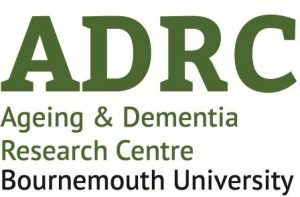
Joanne Holmes from the Ageing and Dementia Research Centre ( ADRC) was invited to present a workshop entitled ‘The Mealtime Experience – what is the impact on an individual’s health and wellbeing?’ at the Partners in Care Quality Matters Conference at Poole Lighthouse. Those attending the workshop represented a range of social care providers and commissioners from across the region. During the workshop participants engaged in lively discussion about the barriers and enablers to good nutritional care for those receiving social care in both the residential setting and home care. Various activities were undertaken including tasting and smelling foods to highlight these barriers. Suggestions were made on how to improve the meal time experience informed by research on nutrition and dementia care, funded by the Burdett Trust for Nursing ( PI Prof Jane Murphy and Co-PI Joanne Holmes) and Joanne’s own PhD studies: An exploration of the factors that affect the extensive meal experience for cognitively active elderly living in residential care.
Both Joanne and Jane were on hand to answer any questions about good nutritional care for the older person throughout the conference and represent the A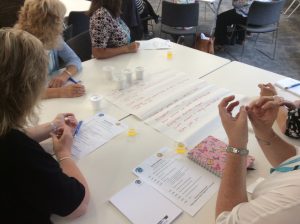 DRC at this key regional showcase event.
DRC at this key regional showcase event.

Ageing and Dementia Research Centre (ADRC) at Royal College of Physicians – launch of Electronic workbook for Nutrition and Dementia care

Professor Jane Murphy, Joanne Holmes and Michelle Board supported by Michelle O’Brien hosted the launch of the online version of the workbook ‘Eating and Drinking Well: Supporting People Living with Dementia’ at the Royal College of Physicians, London on 27th June 2017. Attended by leading stakeholders across health and social care, charities including age UK, hospices, WRVS and housing organisations, this impact event explore how good nutrition and hydration can be improved for people living with dementia.
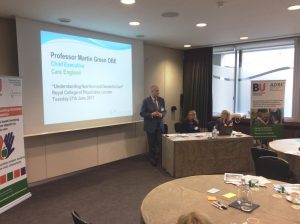
The ADRC was delighted to welcome Professor Martin Green, Chief Executive of Care England who gave an inspiring keynote speech concentrating on the importance of nutrition to ensure dignity in care. He was passionate about the need to raise the profile of good food and nutrition amongst politicians and policy makers to enhance and maintain quality of life for many older people receiving social care. Other speakers included Jan Zietara, Head of Operational Delivery, Health Education England (South) who talked about current work and new developments to enhance the knowledge and skills of the health and social workforce with particular focus on initiatives for dementia education and training. Finally, Kathy Wallis, Senior Programme Manager, Nutrition in Older People Programme, Wessex Academic Health Science Network highlighted the projects, resources and tools undertaken to address the growing concerns of malnutrition (undernutrition) in older people living in the community.
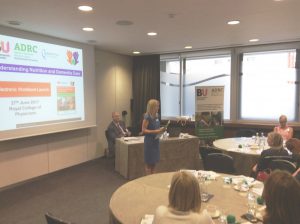
Helped by a lovely afternoon tea, there was active and lively discussion by all participants about how the workbook could help improve the delivery of nutritional care for people with dementia across a range of health and social care sectors. All were very supportive of the training tools and left the event with lots of ideas and identified actions to put into place that would be followed up by the team!
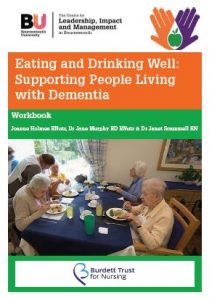 The workbook stems from research funded by the Burdett Trust for Nursing. The workbook is freely downloadable from the website:
The workbook stems from research funded by the Burdett Trust for Nursing. The workbook is freely downloadable from the website:
http://www.bournemouth.ac.uk/nutrition-dementia
It is designed to be used in conjunction with a training film, also available via the website.
New paper Dr. Jenny Hall
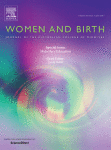 Congratulations to Dr. Jenny Hall in the Faculty of Health & Social Sciences (FHSS) on her new published discussion paper ‘Educating student midwives around dignity and respect’ in the international journal Women and Birth (published by Elsevier). The paper, co-authored with Mary Mitchell (University of the West of England), discusses the issue that there is currently limited information available on how midwifery students learn to provide care that promotes dignity and respect.
Congratulations to Dr. Jenny Hall in the Faculty of Health & Social Sciences (FHSS) on her new published discussion paper ‘Educating student midwives around dignity and respect’ in the international journal Women and Birth (published by Elsevier). The paper, co-authored with Mary Mitchell (University of the West of England), discusses the issue that there is currently limited information available on how midwifery students learn to provide care that promotes dignity and respect.
Well done!
Prof. Edwin van Teijlingen
Centre for Midwifery, Maternal & Perinatal Health
Reference:
- Hall, J., Mitchell, M. (2017) ‘Educating student midwives around dignity and respect’, Women & Birth 30(3): 214-219.
BU research project encourages people with dementia to take up Tai Chi
A new research project is encouraging people with dementia to take up tai chi.
The project, called The TACIT Trial: TAi ChI for people with demenTia, aims to test whether tai chi is of benefit to people with dementia, and of benefit for their carers. Click here to read the full article.
EU AniNex Workshop and Networking Event (22-23 June 2017)
The 3rd Workshop for EU IRSES project on Next Generation Computer Animation Techniques
The “AniNex” workshop on ‘Next Generation Computer Animation Techniques’ was coordinated as part of the Edutainment 2017 conference programme at Bournemouth on 23 June 2017. The workshop was led by program Chair Dr. Jian Chang, co-Chair Prof Jian J. Zhang and Prof Nadia Thalmann.
Over 40 delegates from Europe and China have attended the “AniNex” Workshop. There were 27 submissions out of which 17 were accepted that will be published at the Lecture Notes in Computer Science series (LNCS) by Springer.
The program of the workshop included a keynote presentation on the topic ‘Virtual Humans Modelling and Applications in Gaming and Cultural Heritage’ by Yvain Tisserand and Prof Nadia Thalmann, MIRALab, University of Geneva, Switzerland and Nanyang Technological University, Singapore.
The “AniNex” is funded by the European Commission FP7 Marie Curie Action – international research staff exchange scheme. The project “AniNex” is designed to prepare and lead the development of next-generation techniques related to computer animation and its applications. For more information about the project, please visit project website (http://www.aninex.org)
Innovative narrative concept now available across several platforms

FHSS’ Prof Lee-Ann Fenge & Dr. Kip Jones
FHSS’ Kip Jones and Lee-Ann Fenge are pleased to announce that their article , “Gift Stories How Do We Retell the Stories that Research Participants Give Us?” is now available across several platforms. Along with the open-access version from Creative Approaches to Research now being available, it can be downloaded on Academia.edu and BRIAN.
Jones and Fenge comment: “We can no longer afford to ignore the great advances made in representation of qualitative data. These have been overwhelmingly demonstrated by the successes achieved in auto-ethnography, poetic enquiry, ethno-drama, film, Performative Social Science and/or other arts-based efforts in research and dissemination”.
Narrative methods contribute greatly to the advances made in qualitative research. A narrative style should also be promoted in publications and presentations. This study on older LGBT citizens in rural Britain highlights this by means of a report on one part of that study—a Focus Group.
Narrative researchers are natural storytellers and need to foreground this when reporting studies for publication. Qualitative research is always about story reporting and story making, and narrative research (listening to and retelling stories) is a key democratising factor in qualitative social science research.
BU’s PGR Isabell Nessel at the Department of Life Sciences, University of Roehampton
 I had the pleasure of spending the last three weeks in the Department of Life Sciences (University of Roehampton), working with Dr Giulia Corona and Dr Volker Behrends. We successfully validated an ultra-high performance liquid chromatography coupled with triple quadrupole mass spectrometry (UPLC-MS/MS) method to analyse lipid peroxidation products (breakdown products of fats) in human urine samples.
I had the pleasure of spending the last three weeks in the Department of Life Sciences (University of Roehampton), working with Dr Giulia Corona and Dr Volker Behrends. We successfully validated an ultra-high performance liquid chromatography coupled with triple quadrupole mass spectrometry (UPLC-MS/MS) method to analyse lipid peroxidation products (breakdown products of fats) in human urine samples.
Our ultimate goal is to identify the time-course of oxidative stress and subsequent breakdown of lipids in neonates, by analysing urinary lipid peroxides, to facilitate evidence-based approaches to antioxidant support in preterm neonates. My supervisors Dr Simon Dyall and Prof Minesh Khashu and I are currently developing a pilot study in cooperation with Poole Hospital NHS Foundation Trust to test the feasibility of measuring these products in urine samples from preterm neonates. However, before moving on to preterm samples, the met hod had to be tested and validated, using adult urine samples.
hod had to be tested and validated, using adult urine samples.
The project was made possible by an HSS Seed Corn fund obtained by Dr Simon Dyall, the PGR fund of Isabell Nessel, the collaboration with Dr Giulia Corona and Dr Volker Behrends at the Department of Life Sciences (University of Roehampton) and collaboration with Dr Thierry Durand and his group from the Institute des Biomolecules Max Mousseroux, (Montpellier, France) who generously  provided the standards used in this analysis. I am grateful that I had this opportunity to further develop my research skills and to learn a new state-of-the-art technique and would like to thank all involved for making this possible!
provided the standards used in this analysis. I am grateful that I had this opportunity to further develop my research skills and to learn a new state-of-the-art technique and would like to thank all involved for making this possible!
If you would like to learn more about our research please feel free to contact me at inessel@bournemouth.ac.uk
Isabell
CQR Summer Surgery Sessions about to begin again!


Last Summer the Centre for Qualitative Research organised a series of short (half hour) surgery sessions where participants could ask us any questions that they might have about qualitative methods and their research. If we didn’t have the answer, we have a list of CQR Members who often do!
Dr Kip Jones, Centre Director and Deputy Director, Caroline Ellis-Hill will offer sessions this Summer!
To book a half hour (in person) with Kip at Royal London House on a Tuesday morning or Thursday afternoon, just email kipworld@gmail.com with your possible date. Kip will get back to you with a time.
To book a a half hour (via Skype only) with Caroline on a Wednesday morning, email cehill@bournemouth.ac.uk with our possible date. Caroline will get back to you with a time and Skype arrangements. (We particularly hope that colleagues and students at Yeovil and Portsmouth will take advantage of this particular distance resource.)
CQR members have expertise in a wide range of methods. If necessary, through the surgery process we can connect you up with a particular resourceful person.
- Research as Film/Film as Research
- Photo-elicitation
- Grounded Theory
- Performance Poetry
- Ethics
- Interviewing
- Focus Groups
- Ethnography
- Participatory Action Research
- Autobiography
- Auto-ethnography
- Biographic Narrative Interpretive Method
- Appreciative Inquiry
- Arts-based methods
- Telephone interviews
- Questionnaire design
- NVIVO
- Performance Poetry
- Reflexivity
- Performative Social Science
Sessions will generally run through July and the first half of August.
These sessions seemed to work quite well last Summer. We hope that you will find them a valuable assistance. No need to be a CQR member (but you may want to become one!)
Kip and Caroline
“New” FHSS paper on obesity published July 2017
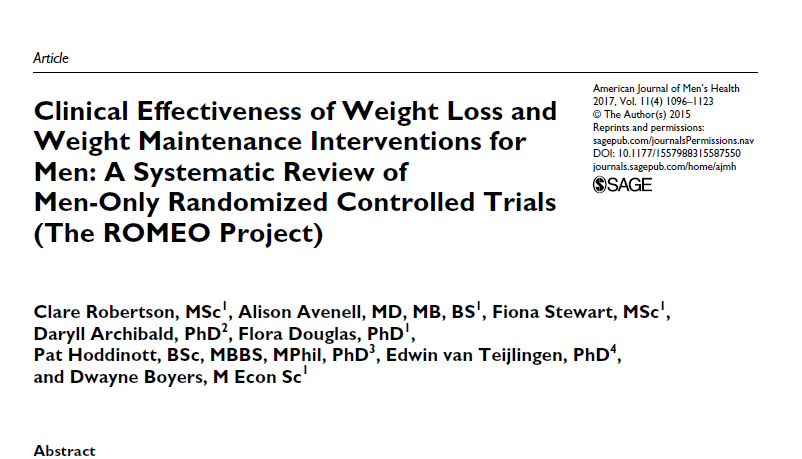
The American Journal of Men’s Health published our latest paper on obesity prevention in men. The paper ‘Clinical Effectiveness of Weight Loss and Weight Maintenance Interventions for Men: A Systematic Review of Men-Only Randomized Controlled Trials (The ROMEO Project)’ originates from a collaboration between BU and various universities in Scotland, led by the University of Aberdeen [1].
This systematic review paper found that reducing diets produced better weight loss than physical activity alone. The most effective interventions combined reducing diets, exercise, and behaviour change techniques . Group interventions produced favourable weight loss results. The paper reports that once engaged, men remained committed to a weight loss intervention.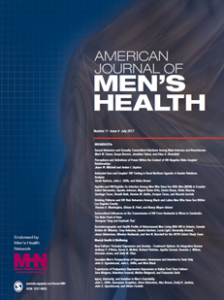
The paper concludes that weight loss for men is best achieved and maintained with the combination of a reducing diet, increased physical activity, and behaviour change techniques. Strategies to increase engagement of men with weight loss services to improve the reach of interventions are needed. This paper is the thirteenth paper from a large NIHR grant [2-13].
The American Journal of Men’s Health is an open access, peer-reviewed resource for cutting-edge information regarding men’s health and illness. It is, however worth noting that although our paper is formally published in July 2017 it has been online for two years! The journal’s website states clearly that the article was first published online on June 30, 2015 BUT the issue in which it appears is published is July 1, 2017!
Prof. Edwin van Teijlingen
CMMPH
Reference:
- Robertson, C., Avenell, A., Stewart, F., Archibald, D., Douglas, F., Hoddinott, P., van Teijlingen, E., Boyers, D. (2017) Clinical effectiveness of weight loss & weight maintenance interventions for men: a systematic review of men-only randomised controlled trials (ROMEO Project), American Journal of Men’s Health 11(4): 1096-1123. http://journals.sagepub.com/doi/full/10.1177/1557988315587550
- Robertson, C, Archibald, D, Avenell, A, Douglas, F., Hoddinott, P., van Teijlingen E, Boyers, D., Stewart, F, Boachie, C, Fioratou E., Wilkins, D, Street, T., Carroll, P., Fowler, C. (2014) Systematic reviews of & integrated report on quantitative, qualitative & economic evidence base for the management of obesity in men. Health Technology Assessment 18(35): 1-424. http://www.journalslibrary.nihr.ac.uk/__data/assets/pdf_file/0019/118180/FullReport-hta18350.pdf
- Stewart, F., Fraser, C., Robertson, C., Avenell, A., Archibald, D., Douglas, F., Hoddinott, P., van Teijlingen, E., Boyers, D. (2014) Are men difficult to find? Identifying male-specific studies in MEDLINE and Embase, Systematics Reviews 3,78.
- Archibald, D, Douglas, F, Hoddinott, P, van Teijlingen, E, Stewart, F., Robertson, C., Boyers, D., Avenell, A. (2015) A qualitative evidence synthesis on management of male obesity. BMJ Open 5: e008372. doi:10.1136/bmjopen-2015-008372 http://bmjopen.bmj.com/content/5/10/e008372.full.pdf+html
- Boyers, D, Stewart, F, Fraser, C, Robertson, C, Avenell, A, Archibald, D, Douglas, F, Hoddinott P, van Teijlingen E. (2015). A systematic review of the cost-effectiveness of non-surgical obesity interventions in men, Obesity Research & Clinical Practice 9(4), 310-327.
- Robertson, C, Avenell, A, Boachie, C., Stewart, F., Archibald D., Hoddinott, P, Douglas, F, van Teijlingen E, Boyers D. (2016) Should weight loss and maintenance programmes be designed differently for men? Systematic review of long-term RCTs presenting data for men & women: The ROMEO Project, Obesity Research & Clinical Practice 10: 70-84.
- Robertson, C., Avenell, A., Boachie, C., Stewart, F., Archibald, D., Douglas, F., Hoddinott, P., van Teijlingen, E., Boyers, D. (2015) Should weight loss programmes be designed differently for men and women? The ROMEO Project, Appetite 87: 374.
- Robertson, C., Avenell, A., Stewart, F., Archibald, D., Douglas, F., Hoddinott, P., van Teijlingen, E., Boyers, D. (2015) A systematic review of long-term weight management randomized controlled trials for obese men. The ROMEO Project, Appetite 87: 374.
- Robertson, C., Avenell, A., Stewart, F., Archibald, D., Douglas, F., Hoddinott, P., van Teijlingen, E., Boyers, D. (2015) A systematic review of weight loss interventions in the UK. The ROMEO Project, Appetite 87: 375.
- Boyers, D., Avenell, A., Stewart, F., Robertson, C., Archibald, D., Douglas, F., Hoddinott, P., van Teijlingen, E., (2015) A systematic review of the cost-effectiveness of non-surgical obesity interventions in men, Appetite 87: 375.
- Archibald, D., Douglas, F., Hoddinott, P., van Teijlingen, E., Boyers, D., Avenell, A., Stewart, F., Robertson, C., (2015) A qualitative evidence synthesis on the management of male obesity. The ROMEO Project, Appetite 87: 381.
- Avenell, A., Robertson, C., Boachie, C., Stewart, F Archibald, D., Douglas, F., Hoddinott, P., van Teijlingen, E. (2016) Sex based subgroup differences in randomized controlled trials: empirical evidence from Cochrane meta-analyses BMJ 355:i5826 http://www.bmj.com/content/355/bmj.i5826/rapid-responses
- Avenell, A., Robertson, C., Stewart, F., Boyers, D., Douglas, F., Archibald, D., van Teijlingen, E., Hoddinott, P., Boachie, C. (2016) Sex can affect participation, engagement, and adherence in trials, BMJ 355:i6754 http://www.bmj.com/content/bmj/355/bmj.i6754.full.pdf
Belonging in a post-Brexit-vote Britain (British Sociological Association) conference
BU academic presented at ‘Belonging in a post-Brexit-vote Britain: researching race, ethnicity and migration in a changing landscape’ conference at the University of Sheffield (co-organised by the British Sociological Association and the Migration Research Group)
I presented an on-going project, Migrant and Refugee Leisure Spaces and Community Well-being at ‘Belonging in a post-Brexit-vote Britain: researching race, ethnicity and migration in a changing landscape’ conference at the University of Sheffield in May. A report of the conference can be found here: https://www.sheffield.ac.uk/socstudies/scsnews/bsa-migration-conference-1.701133
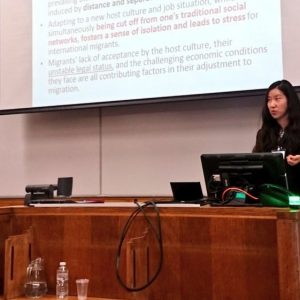
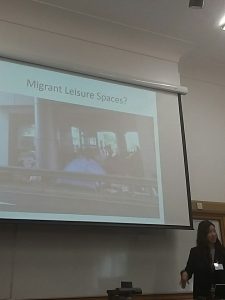
[Dr. Jaeyeon Choe, Senior Academic presenting at Sheffield]
The ‘Migrant and Refugee Leisure Spaces and Community Well-being’ presentation got much interest from the audience, who were primarily sociologists. Discussions flowed around “how” leisure spaces and practices can help migrants integrate into communities and enhance their well-being, and how migrants define social inclusion, integration and well-being differently from scholarly (often middle class and ‘white’) definitions. Other discussions surrounded how some cultures have segregated and have ‘invisible’ leisure spaces whilst others prefer generic space to gather.
Prof. Louise Ryan in Sociology at University of Sheffield emphasised that we need to develop comparative lenses and more holistic and international perspectives from different scales. We need to talk across fields and disciplines to move forward to understand migrants’ lives, well-being and integration.
“The impact of the referendum, means that researchers on intra-EU migration, those working on refugee studies and on ‘race’ and ethnic studies, need to come together to share insights and collaborate to develop new analytical frameworks to understanding the evolving implications of Brexit.”
The tourism and leisure field has much to offer and contribute in the exploration of migrant lives and their integration in the UK. Existing research suggests that leisure spaces provide migrants with opportunities for developing, expressing and negotiating their personal, social and cultural preferences safely whilst gaining recognition and a sense of belonging. This is especially important as they may confront issues relating to belongingness, societal membership, social status, self-perception and cultural confusion. Leisure can be instrumental to (re)establishing connections and networks with locals as well as other migrants and refugees, and provide spaces for problem solving. Leisure opportunities and spaces support the development of cultural capital to allow migrants to feel safe enough to contemplate building a productive life. Thus, leisure spaces can play an important role in integration. The role of leisure in integration also reflects the receiving community feeling unthreatened by migration.
I also participated in an Early Career Researcher Mentoring session with Prof. Louise Ryan during the conference. I found the session very useful as I received advice on research, publishing and networking in the migration studies field and beyond. Prof. Ryan also shared helpful insights and advice on career development strategies in the UK, especially for migrant young female researchers with similar profiles to me. This was an unusual programme during an academic conference that can be widely utilised by other conference and workshop organizers. I found the session extremely helpful in aiding my understanding of the academic culture in the UK and how to adapt to it as a young researcher from a migrant background.
https://www.britsoc.co.uk/about/latest-news/2017/may/mentoring-caf%C3%A9-it-isnt-just-chatting-over-coffee/?utm_source=newsletter&utm_medium=email&utm_campaign=may_news&utm_content=louise_ryan
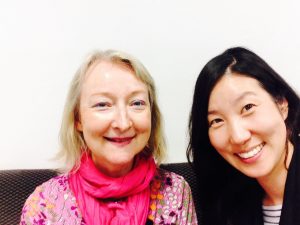
Another interesting feature of the conference was a photographer as a keynote speaker. Jeremy Abrahams (theatre & portrait photographer) shared powerful visual work of the impact of Brexit entitled, ‘Remain/Leave’.
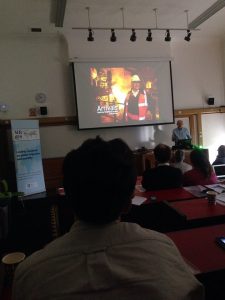
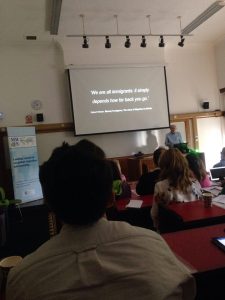
A keynote by Dr. Jon Fox at University of Bristol emphasised ‘Everyday Racism’ and how it has increased after the EU Referendum. He discussed pathological integration: East Europeans, racism & becoming British.
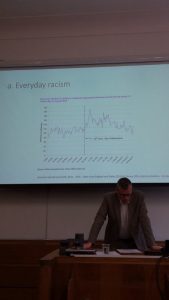
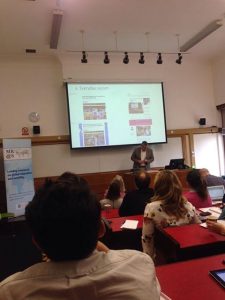
Finally, fellow conference delegates took photos of my presentation and posted them with useful comments/questions on the conference twitter page. After I mentioned a Bourenmouth University migrant well-being project twitter account, 10 immediately followed us, and had led to interesting and useful connections with fellow researchers with similar interests. 🙂 It was not only productive in getting feedback and comments on our on-going research project, but also great to meet migrant studies researchers to network.
For more information about our migrant and refugee leisure spaces and community
well-being project, please follow the Facebook Group: ‘Migrant Leisure Spaces’, Twitter: @migrantspaces and the project web page: https://research.bournemouth.ac.uk/project/migrant-refugee-leisure-wellbeing/
New CFP: Psychosocial Reflections on a Half Century of Cultural Revolution; Bournemouth University,
Association for Psychosocial Studies Biennial Conference
Bournemouth University, 5th-7th April 2018

‘Psychosocial Reflections on a Half Century of Cultural Revolution:
The 50th anniversary of seasons of love and protest’
Extended Deadline for proposals! Submit by October 1st
Join us to reflect on revolutionary relationships and revolutionary politics which challenged authority then and which influence us now.
The cultural forces and the political movements of 1967 and 1968 aimed to change the world, and did so. Recent development of some populist and protest politics could be seen as a continuation of the revolutionary movements in the 1960s. Hedonic themes that recall the summer of love suffuse contemporary life, and self-reflection and emotional literacy have also become prominent values, linked towards human diversity and the international community.
We invite you to offer psychosocial analyses of the development and legacy today of the ‘revolutions’ in love, sex and politics. This could be via explorations of contemporary issues in politics, culture and artistic expression, or through historical studies. All proposals for papers must indicate how they address both psychological and social dimensions of their topic.
Send your abstract of 250-300 words to: APS2018@bournemouth.ac.uk
Deadline: 1st October 2017. Confirmation of acceptance: 1st November.
We welcome contributions from academics and practitioners from different fields and disciplines and very much look forward to seeing you there.
New BU publication: Centre of Postgraduate Medical Research &Education
Congratulations to Dr. Sam Rowlands, Visiting Professor in the Faculty of Health & Social Sciences, who published an interesting Commentary in the BJOG together with Prof. Roger Ingham from the University of Southampton. Their paper ‘Long-acting reversible contraception: conflicting perspectives of advocates and potential users’ argues that a patient-centred approach to contraceptive care is fundamental to women’s autonomy. The authors remind the readers that it needs to be appreciated that unintended pregnancy is most likely to be reduced by fulfilling the unmet need for contraception and encouraging those not using any form of contraception, or condoms only, to use a method of their choice accompanied by adequate instruction (where necessary) in correct usage.
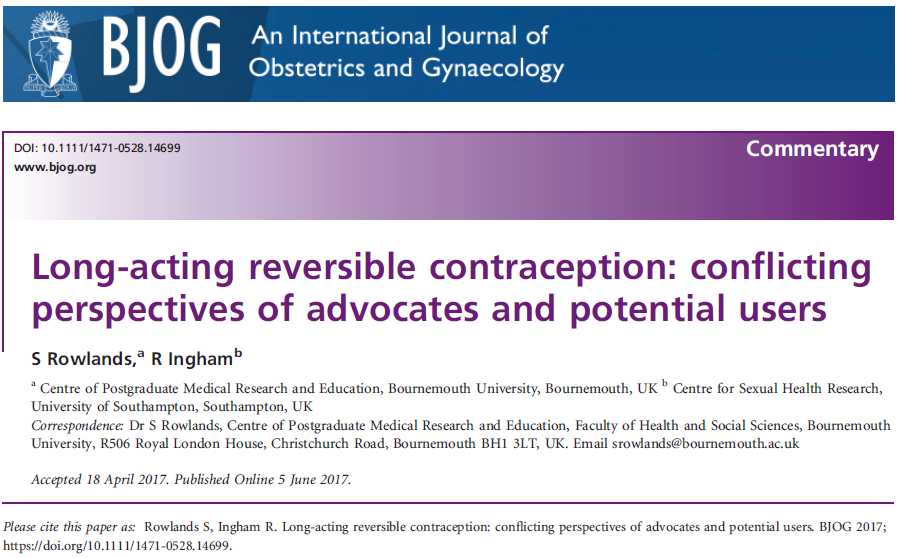
Oxford Business Law Blog invites commentary from BU’s Donald Nordberg
The University of Oxford’s Faculty of Law invited Donald Nordberg, Associate Professor in the BU Faculty of Management, to contribute a commentary to the widely read Oxford Business Law Blog. The piece is an essay concerning the creation of the Cadbury Code on corporate governance 25 years ago, and its subsequent revisions, and then pointing to questions about its continuing validity in the wake of the global financial crisis and changes in the investment landscape. The essay summarises his working paper, posted on Social Sciences Research Network, which reviews the nature of the debate over one key and recurrent issue: whether the UK should adopt something like the two-tier boards of directors common across continental Europe.
BU Faculty of Management, to contribute a commentary to the widely read Oxford Business Law Blog. The piece is an essay concerning the creation of the Cadbury Code on corporate governance 25 years ago, and its subsequent revisions, and then pointing to questions about its continuing validity in the wake of the global financial crisis and changes in the investment landscape. The essay summarises his working paper, posted on Social Sciences Research Network, which reviews the nature of the debate over one key and recurrent issue: whether the UK should adopt something like the two-tier boards of directors common across continental Europe.
Maternal mental health in Nepal ICM presentation
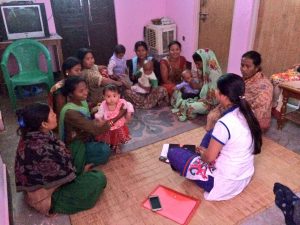 As promised to our audience at the 31st International Confederation of Midwifery Triennial Congress in Toronto today: the slides used on our session ‘Mental health training for community maternity workers in Nepal. The slides in PDF format can be accessed here: Nepal THET ICM 2017. Our project brought together academics, midwives, nurses, and other health workers in Nepal and the UK to help in the training of Auxiliary Nurse Midwives in Nawalparasi on key aspects of mental health and mental health promotion. The project led by Bournemouth University was funded under the Health Partnership Scheme (HPS) which is managed by a London-based organisation called THET (Tropical Health & Education Trust).
As promised to our audience at the 31st International Confederation of Midwifery Triennial Congress in Toronto today: the slides used on our session ‘Mental health training for community maternity workers in Nepal. The slides in PDF format can be accessed here: Nepal THET ICM 2017. Our project brought together academics, midwives, nurses, and other health workers in Nepal and the UK to help in the training of Auxiliary Nurse Midwives in Nawalparasi on key aspects of mental health and mental health promotion. The project led by Bournemouth University was funded under the Health Partnership Scheme (HPS) which is managed by a London-based organisation called THET (Tropical Health & Education Trust).
Can I also take the opportunity to list all our collaborators in Nepal and UK:
Padam Simkhada, Bhimsen Devkota, Shyam K. Maharjan, Lokendra Sherchan, Ram Chandra Silwal, Krishna Acharya, Bishnu G.C., Ram K. Maharjan, Bibha Simkhada, Jillian Ireland, Jane Stephens, Colette Fanning, Edwin van Teijlingen, Geeta Sharma, Samridhi Pradhan, Seam MacKay, Ish Fawcett, Andrea Lawrie, Dave Havelock, Liz Murphy, Rose Pringle, Sapana Bista, Chrissy Reeves & Flora Douglas.
Prof. Edwin van Teijlingen
Centre for Midwifery, Maternal & Perinatal Health
Review published on BU co-edited academic book
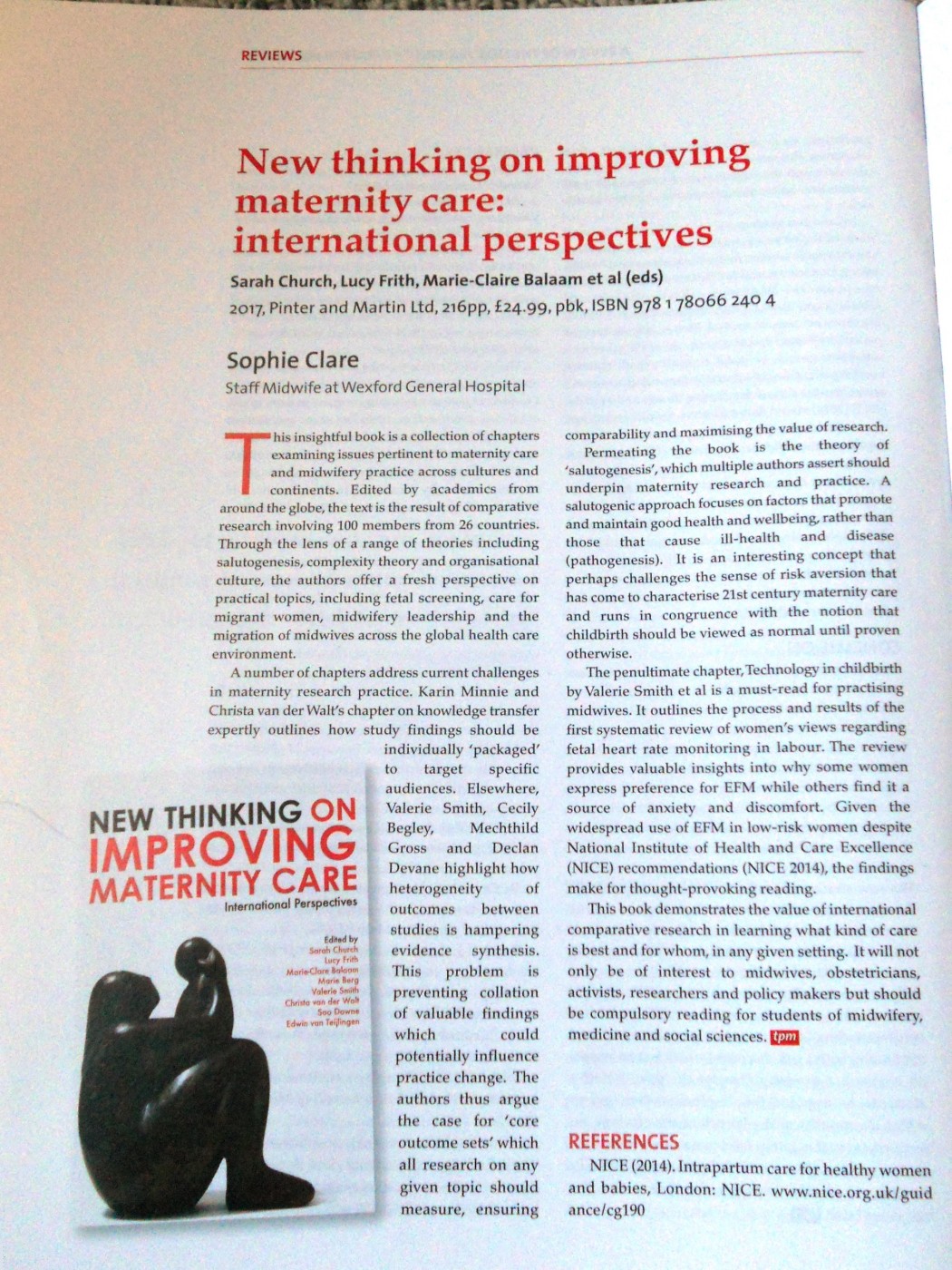 Sometimes we use the BU Research Blog to report on our own research and publications, sometimes post blogs about the works of colleagues. Occasionally we have the pleasure to report on something written about, or in reply to, our own studies. This book review in The Practising Midwife [1] falls in the latter category as it reviews our recently published edited volume New Thinking on Improving Maternity Care: International Perspectives. This volume is edited by academic from across the varies countries [2]. The book is the result of years of comparative international research, funded by the EU (European Union) through its COST Action. The book sets out to generate the best possible evidence across a range of childbirth practices, contexts, and issues in Europe (and beyond).
Sometimes we use the BU Research Blog to report on our own research and publications, sometimes post blogs about the works of colleagues. Occasionally we have the pleasure to report on something written about, or in reply to, our own studies. This book review in The Practising Midwife [1] falls in the latter category as it reviews our recently published edited volume New Thinking on Improving Maternity Care: International Perspectives. This volume is edited by academic from across the varies countries [2]. The book is the result of years of comparative international research, funded by the EU (European Union) through its COST Action. The book sets out to generate the best possible evidence across a range of childbirth practices, contexts, and issues in Europe (and beyond). 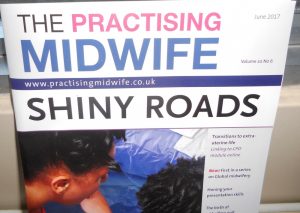
The reviewer is Sophie Clare a Staff Midwife at Wexford General Hospital finds it an insightful book which is “a collection of chapters examining issues pertinent to maternity care and midwifery practice across cultures and continents.” She concludes that our book “demonstrates the value of international comparative research in learning what kind of care is best and for whom, in any given setting.”
Professor Edwin van Teijlingen
Centre for Midwifery, Maternal & Perinatal Health
References:
- Clare, S. (2017) New Thinking on Improving Maternity Care: International Perspectives, Sarah Church, Lucy Firth, Marie-Claire Balaam et al (ads) 2017, Pinter and Martin Ltd, 216pp, £24.99, pbk, ISBN 978 178066 240 4 [book review], The Practising Midwife 20(6):36.
- Church, C., Firth, L., Balaam, M-C., Berg, M., Smith, V., van der Walt, C., Downe, S., van Teijlingen, E. (Eds.) (2017) New Thinking on Improving Maternity Care: International Perspectives, London: Pinter & Martin
BU posters at international midwifery conference
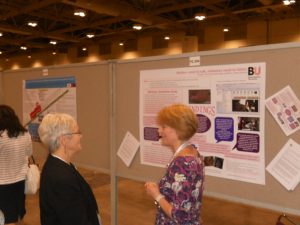 BU academics from the Faculty of Health & Social Sciences had a strong presence at the International Confederation of Midwives (ICM) in Canada this lunch time. They presented four separate academic posters today at the ICM conference in Toronto. First, Dr. Alison Taylor presented her poster ‘Mothers need to talk, midwives need to listen: Insights from breastfeeding mother’s video diaries’. Secondly, Sara Stride and Dr. Sue Way presented their poster on ‘UUPP Study: Updating the Understanding of Perineal Practice at the time of birth across the United Kingdom’.
BU academics from the Faculty of Health & Social Sciences had a strong presence at the International Confederation of Midwives (ICM) in Canada this lunch time. They presented four separate academic posters today at the ICM conference in Toronto. First, Dr. Alison Taylor presented her poster ‘Mothers need to talk, midwives need to listen: Insights from breastfeeding mother’s video diaries’. Secondly, Sara Stride and Dr. Sue Way presented their poster on ‘UUPP Study: Updating the Understanding of Perineal Practice at the time of birth across the United Kingdom’.
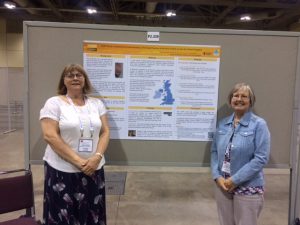 Prof. Vanora Hundley, Dr. Ann Luce (BU Faculty of Media & Communication), Prof. Edwin van Teijlingen and two students, Sofie Edlund and Sian Ridden also presented their poster on ‘Changing the narrative around birth: midwives’ views of working with the media’.
Prof. Vanora Hundley, Dr. Ann Luce (BU Faculty of Media & Communication), Prof. Edwin van Teijlingen and two students, Sofie Edlund and Sian Ridden also presented their poster on ‘Changing the narrative around birth: midwives’ views of working with the media’. 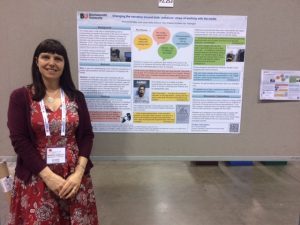
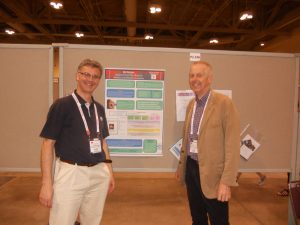 And, last but not least, Prof. Vanora Hundley and Prof. Edwin van Teijlingen also contributed to a poster produced by Dr. Andrew Symon and colleagues from across the UK: ‘Midwifery-led antenatal care models: Mapping a systematic review to an evidence-based quality framework to identify key components and characteristics of care’.
And, last but not least, Prof. Vanora Hundley and Prof. Edwin van Teijlingen also contributed to a poster produced by Dr. Andrew Symon and colleagues from across the UK: ‘Midwifery-led antenatal care models: Mapping a systematic review to an evidence-based quality framework to identify key components and characteristics of care’.











 FHSS academics teaching in Nepal
FHSS academics teaching in Nepal New weight change BU paper
New weight change BU paper One week to go! | The 16th Annual Postgraduate Research Conference
One week to go! | The 16th Annual Postgraduate Research Conference Geography and Environmental Studies academics – would you like to get more involved in preparing our next REF submission?
Geography and Environmental Studies academics – would you like to get more involved in preparing our next REF submission? Congratulations to three former BU staff
Congratulations to three former BU staff MSCA Staff Exchanges 2024 Call – internal deadline
MSCA Staff Exchanges 2024 Call – internal deadline Applications are now open for 2025 ESRC Postdoctoral Fellowships!
Applications are now open for 2025 ESRC Postdoctoral Fellowships! Horizon Europe – ERC CoG and MSCA SE webinars
Horizon Europe – ERC CoG and MSCA SE webinars MaGMap: Mass Grave Mapping
MaGMap: Mass Grave Mapping ERC grants – series of webinars
ERC grants – series of webinars